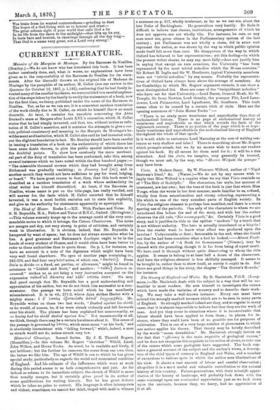Historical Gleanings. Second Series. By J. E. Thorold Rogers. (Macmillan.)—In
this volume Mr. Rogers "sketches" Wiklif, Laud, John Wilkes, and Horne Tooke. As usual, he is readable and lively, if not brilliant ; but the further he removes the scene from our own time, the better we like him. The age of Wiklif is one to which he has given special study, particularly as regards the social and economical condition of England. And his estimate of the influences which were at work during this period seems to us both comprehensive and just. As far indeed as relates to its immediate subject, the sketch of Wiklif is more than usually meagre, but it certainly gives proof in its author of some qualifications for writing history. But he has great defects which he takes no pains to correct. His language is often intemperate and victlent, sometimes, we cannot but think, tinged with malice, witness a sentence on p. 217, wholly irrelevant, as far as we can see, about the late Duke of Buckingham. Ho generalizes very hastily. He finds it difficult to believe that classes, institutions, arrangements of which he does not approve, are not wholly vile. For instance, he sees, as any man must see, gross abuses in the Parliamentary system of the last century ; yet Parliament was not wholly a sham, did in some sort represent the nation, as was shown by the way in which public opinion made itself felt more than once. He disapproves of the way in which Oxford has behaved to her representatives ; yet this feeling—in which the present writer shares, he may say, most fully—does not justify him in saying that except on rare occasions, the University "has been represented by the most trivial nobodies which the House contains." Sir Robert H. Inglis and Sir W. Heathcote, typical University members were not "trivial nobodies," by any means. Probably the representa- tives of Oxford have always been above the average of members. As for Cambridge, to which Mr. Rogers' argument extends, it can show a most distinguished list. Hero are some of the "insignificant nobodies" who have sat for that University,—Lord Bacon, General Monk, Sir W. Temple, Sir Isaac Newton, Lord Granby, the younger Pitt, Lord Lans- downe, Lord Palmerston, Lord Lyndhurst, Mr. Goulburn. This fault seems often to be caused by a certain trick of style. Here are the opening sentences of "John Horne Tooke ":—
" There is no study more wearisome and unprofitable than that of ecclesiastical history. There is no page of ecclesiastical history so wearisome and unprofitable as that which records the facts of the eighteenth century. There is no portion of the page which is so hope- lessly wearisome and unprofitable in the ecclesiastical history of England throughout the whole of that epoch."
Is it worth while to caricature Lord Macaulay at the cost of writing sen- tences so very shallow and false ? There is something about Mr. Rogers which prompts attack, but we by no moans wish to warn our readers against his book. By all means let them send for it ; it will be a fine stimulant. And the facts, we imagine, may generally be trusted, though we must ask, by the way, who "Horace Walpole the younger" may have been.


































 Previous page
Previous page